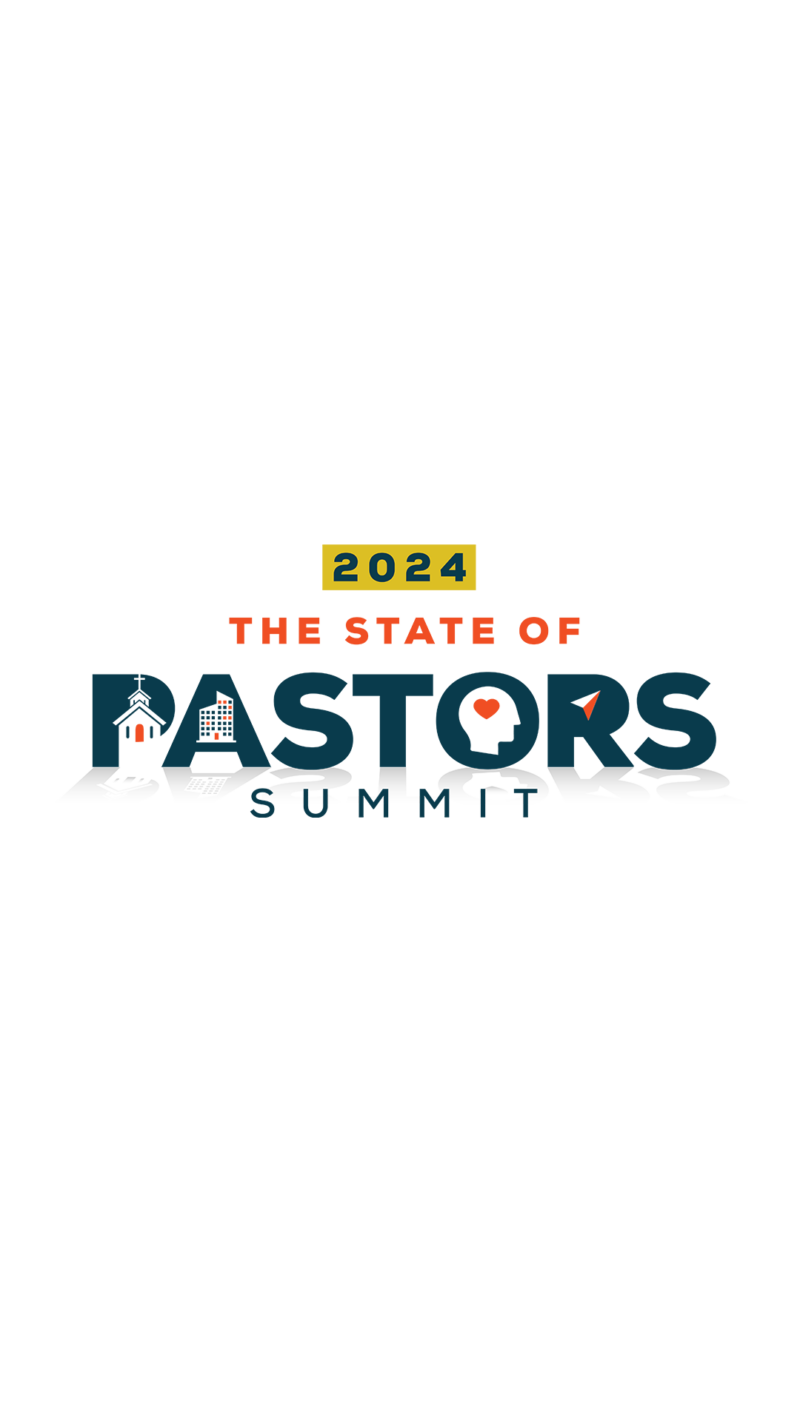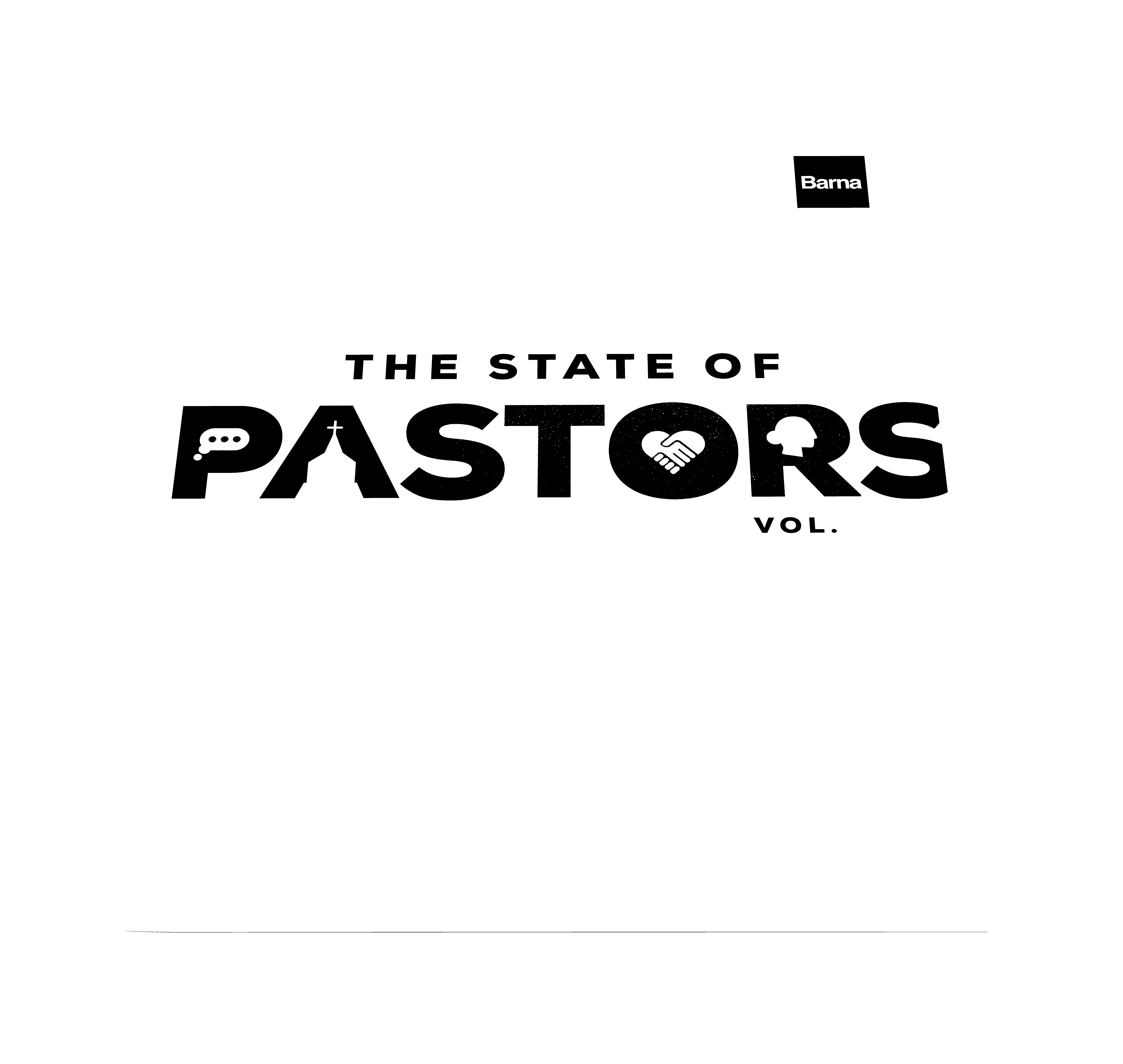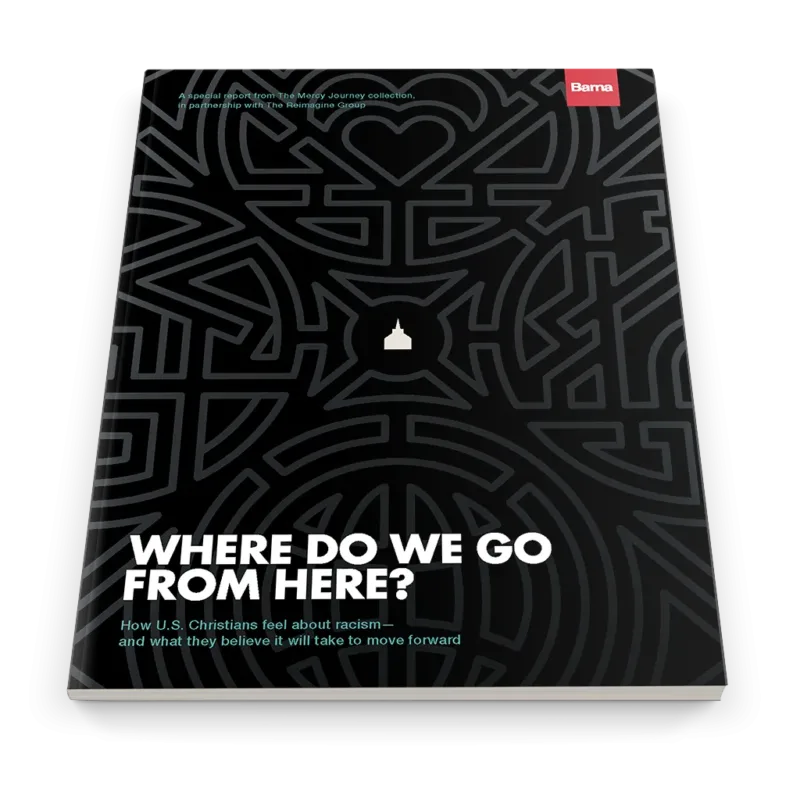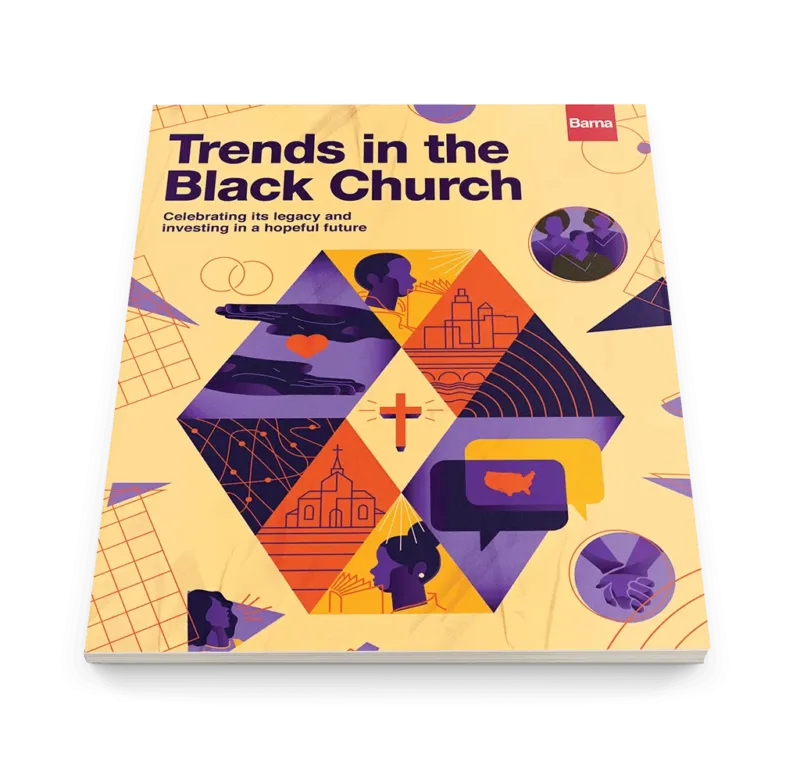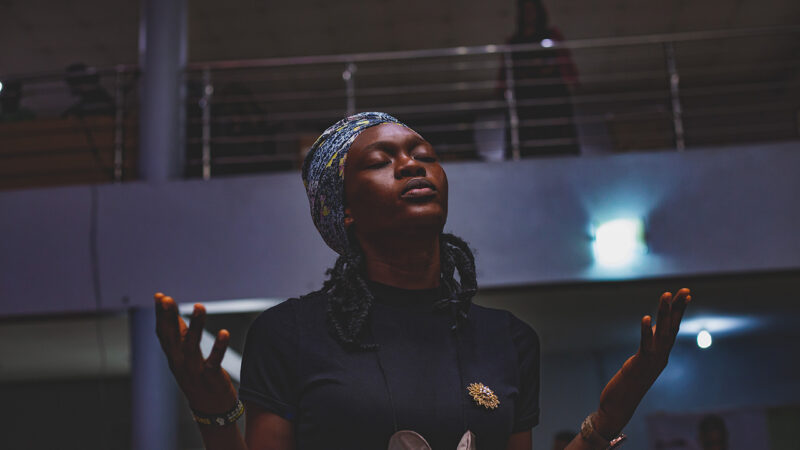
The public outrage over the deaths of Trayvon Martin, Eric Garner, Freddie Gray and others has brought to light the often-unheeded reality of racial tension here in the United States. The nation witnessed the pain, grief, and indignation among African Americans as protests began in cities like Ferguson and Baltimore and spread across the country sparking the “Black Lives Matter” movement. But this movement has met with a mixed response, reflecting a deeper divide on how Americans view the problem of race in this country.
So what are the contours of this divide? And what do Americans really believe about the Black Lives Matter movement? To explore the issue in more detail, Barna Group asked American adults about their experience with race. Is there anger and hostility between different ethnic and racial groups? Is racism a problem of the past, or the present? Do people feel disadvantaged because of their race or ethnicity? Can the church play a role in racial reconciliation, or is the church part of the problem?
Where Do We Go From Here?
How U.S. Christians feel about racism - and what they believe it will take to move forward
Racial Tension Today
More than 50 years after the March on Washington, work to heal the wounds of hundreds of years of racial injustice remains to be done. When American adults are asked whether they believe racial tension exists, the answer to that question is a resounding “yes.” The vast majority of adults agree there is a lot of anger and hostility between ethnic and racial groups in America (84%). This was true—and remarkably so—across the board. No matter the age group, region, ethnicity, socioeconomic status, or faith segment, the vast majority among each group believe there is tension among racial and ethnic groups in this country.
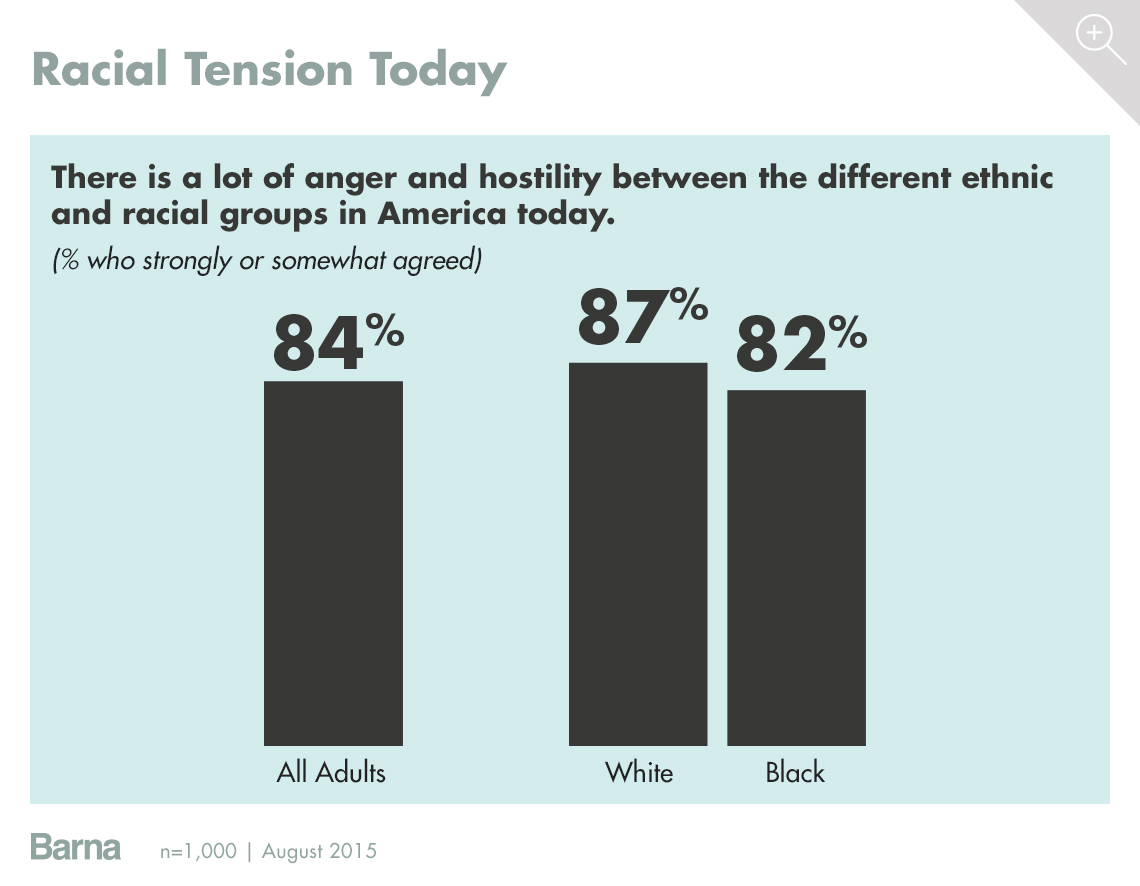
But when asked more specifically about racism, that is, “prejudice, discrimination, or antagonism directed against someone of a different race based on the belief that one’s own race is superior,” the results were slightly different. There were two big standouts here, the first being evangelicals, who were almost twice as likely than the general population to agree strongly that “racism is mostly a problem of the past, not the present” (13% compared to all adults at 7%, or “no faith” at 3%). The other group with a high proportion of respondents agreeing that racism is mostly a problem of the past is conservatives at 12 percent, which is also interesting considering the comparison to liberals at 4 percent. Conservatives are those who identify as mostly conservative, and Democrats are those who identify as mostly liberal when it comes to political issues.
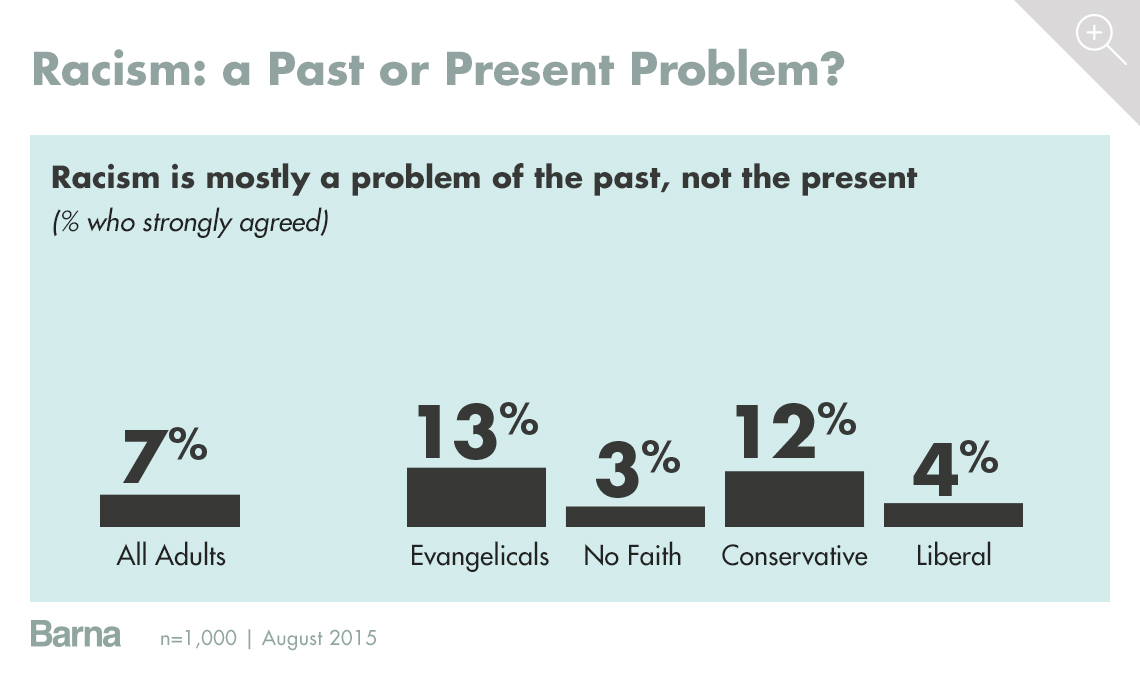
Looking at this question from a different angle—those who strongly disagree that “racism is mostly a problem of the past, not the present”—we see some differences between black and white Americans. 42 percent of the general population strongly disagree that racism is a problem of the past, and although both black and white Americans share that sentiment, black Americans (59%) are twenty percentage points more likely to disagree that racism is history than white Americans (39%)
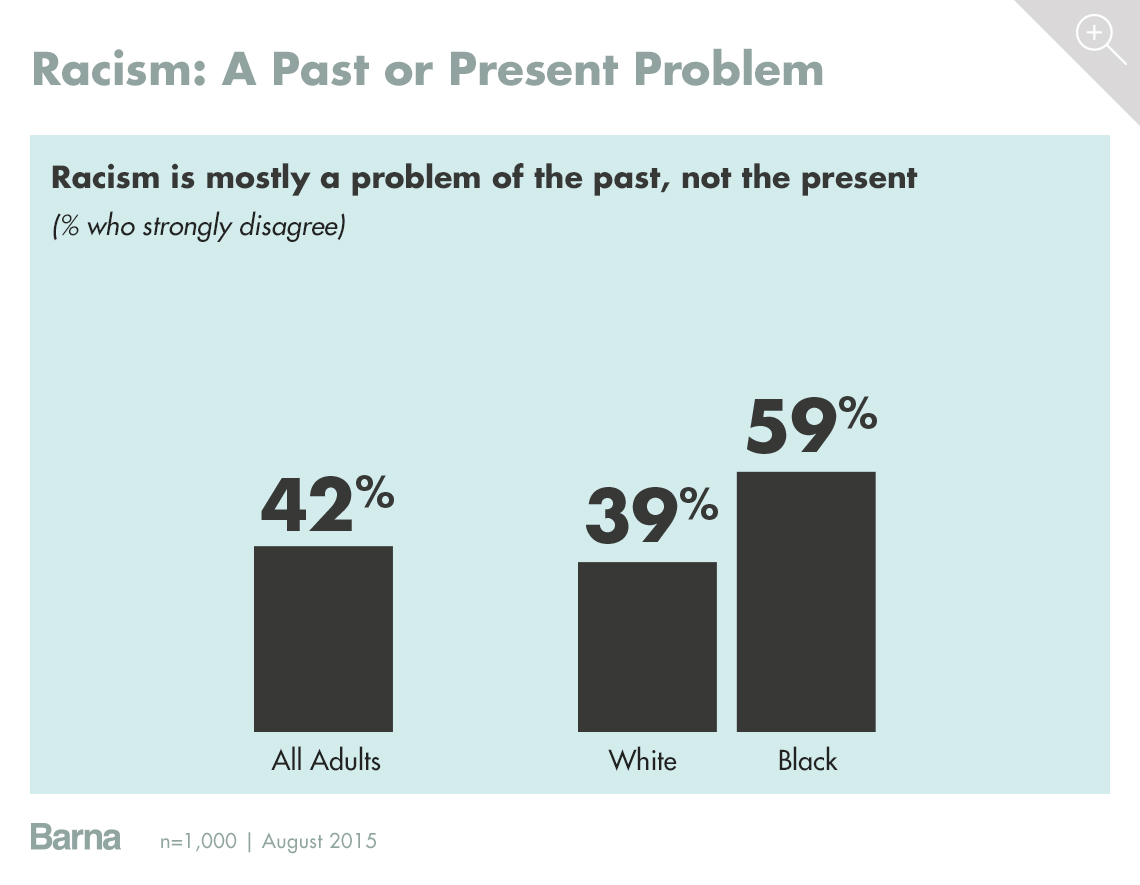
Differing Opinions About Its Impact
When it comes to the lived experience of people of color in this country, seven in 10 Americans agree they “are often put at a social disadvantage because of their race” (67%). However, once again evangelicals and Republicans are less likely than the general population to believe this is true. For example, evangelicals are 11 percentage points less likely than the adult average to believe people of color are at a social disadvantage (56% compared to 67%), and this gap widens even further when you look at the figures from another angle.
Evangelicals are more than twice as likely as the general population to “strongly disagree” that people of color are socially disadvantaged because of race (28% compared to 12%). This is also the case for Republicans who are 10 percentage points less likely than the adult average (57% compared to 67%), and 21 percentage points less likely than democrats (57% compared to 78%), to believe people of color are at a social disadvantage (57%), and more than twice as likely as democrats to “strongly disagree” that people of color are socially disadvantaged because of race (17% compared to 8%).
There are also deep divides between black Americans and white Americans. 84 percent of black Americans agree that people of color are often put at a social disadvantage because of their race, while only 62 percent of white Americans agree—lower than the national average, though still higher than either evangelicals or Republicans.
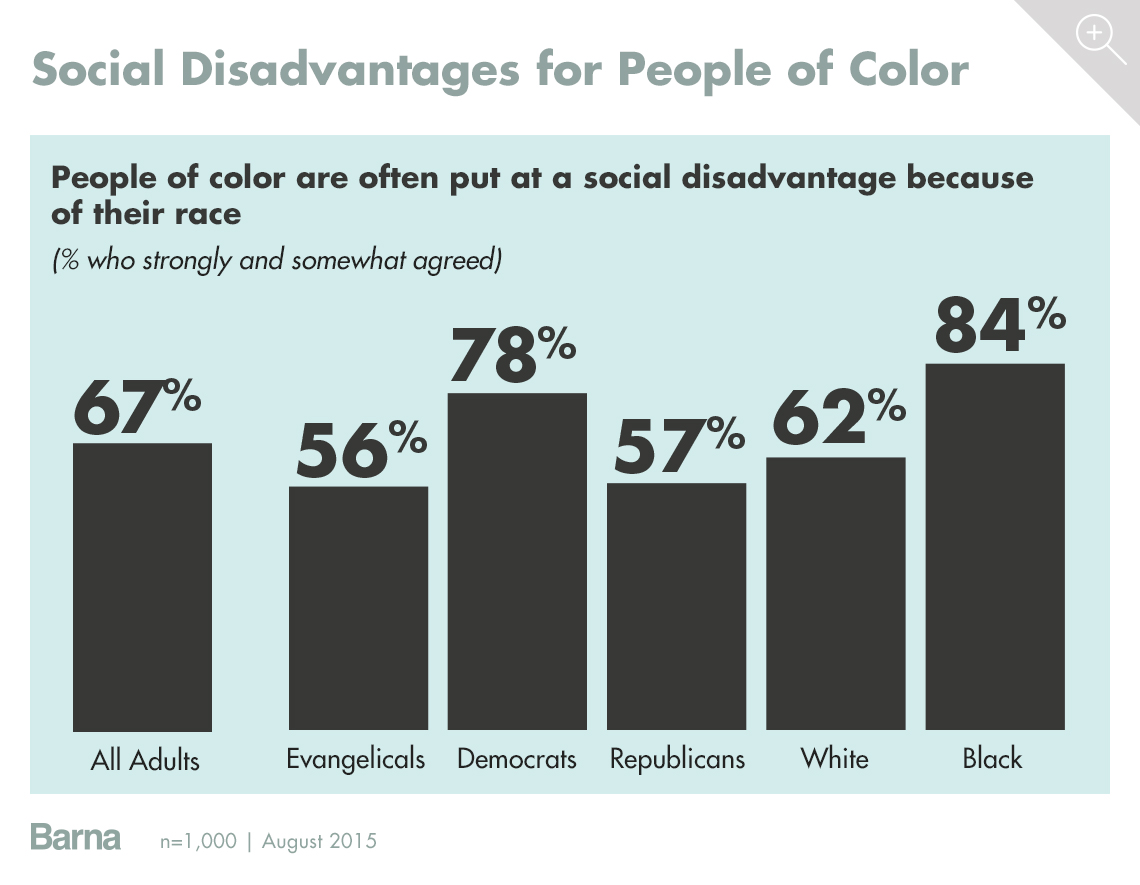
There are even deeper divides when it comes to reverse racism. Seven in 10 white people strongly and somewhat agree that prejudicial treatment of them is a problem in our society today (71%). But, the black population isn’t as convinced—less than half agree that prejudicial treatment of white people is a problem (46%). There is an equally deep divide between Republicans and Democrats, the former being one third more likely than the latter to believe reverse racism is a problem (77% of Republicans compared to 53% of Democrats). This makes sense in light of the fact that white people make up 85 percent of the Republican Party, while making up only half in the Democratic Party (54%).
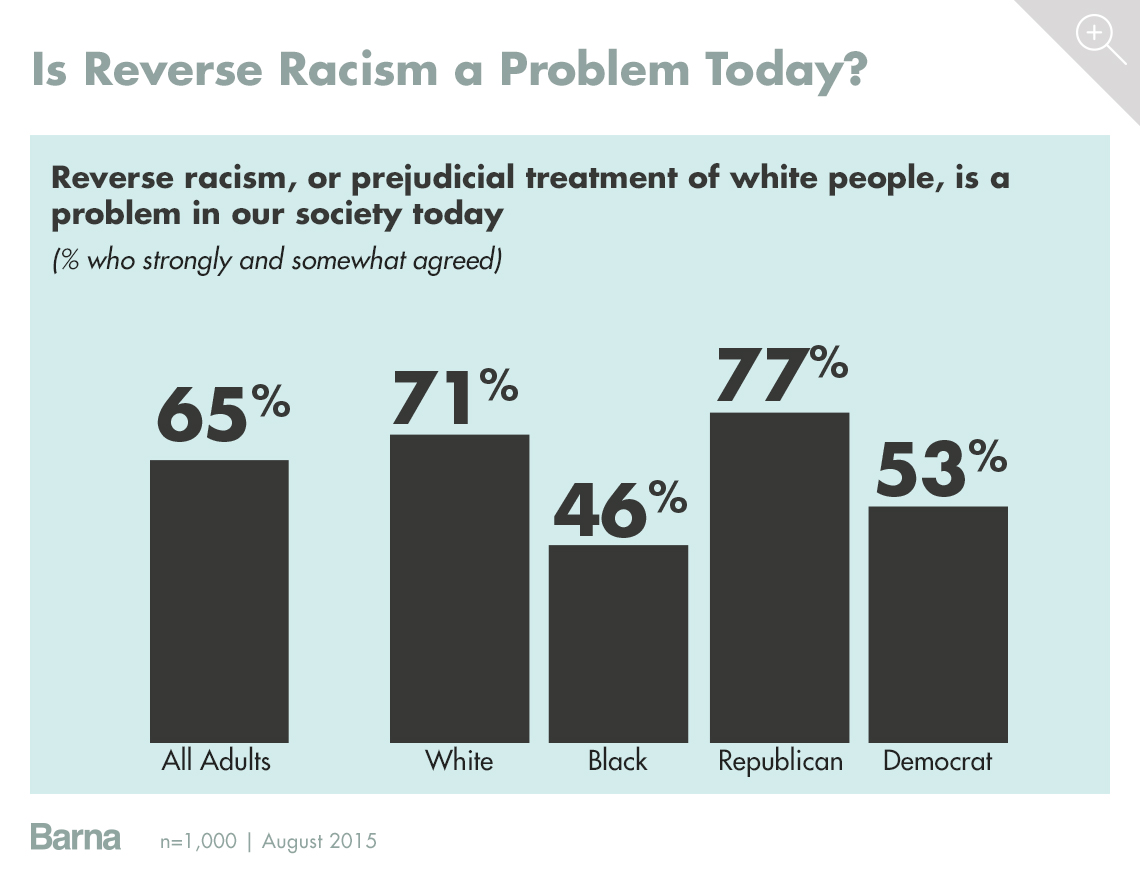
Black Lives Matter
Following the death of Trayvon Martin and the acquittal of George Zimmerman, the Black Lives Matter movement emerged with the use of the social media hashtag #BlackLivesMatter. The movement gained notoriety following street demonstrations across the country in response to the deaths of Michael Brown and Eric Garner in New York City. But the movement has met with a mixed response. Millennials are most likely to support the message of Black Lives Matter (45%), but this support decreases with age (24% among Gen-Xers, 20% among Boomers, and 15% among Elders). Again, the outliers here are evangelicals and Republicans (especially compared to Democrats), both of which are significantly less likely than the general population to support the movement (13% of evangelicals and 7% of Republicans compared to 27% of all adults).
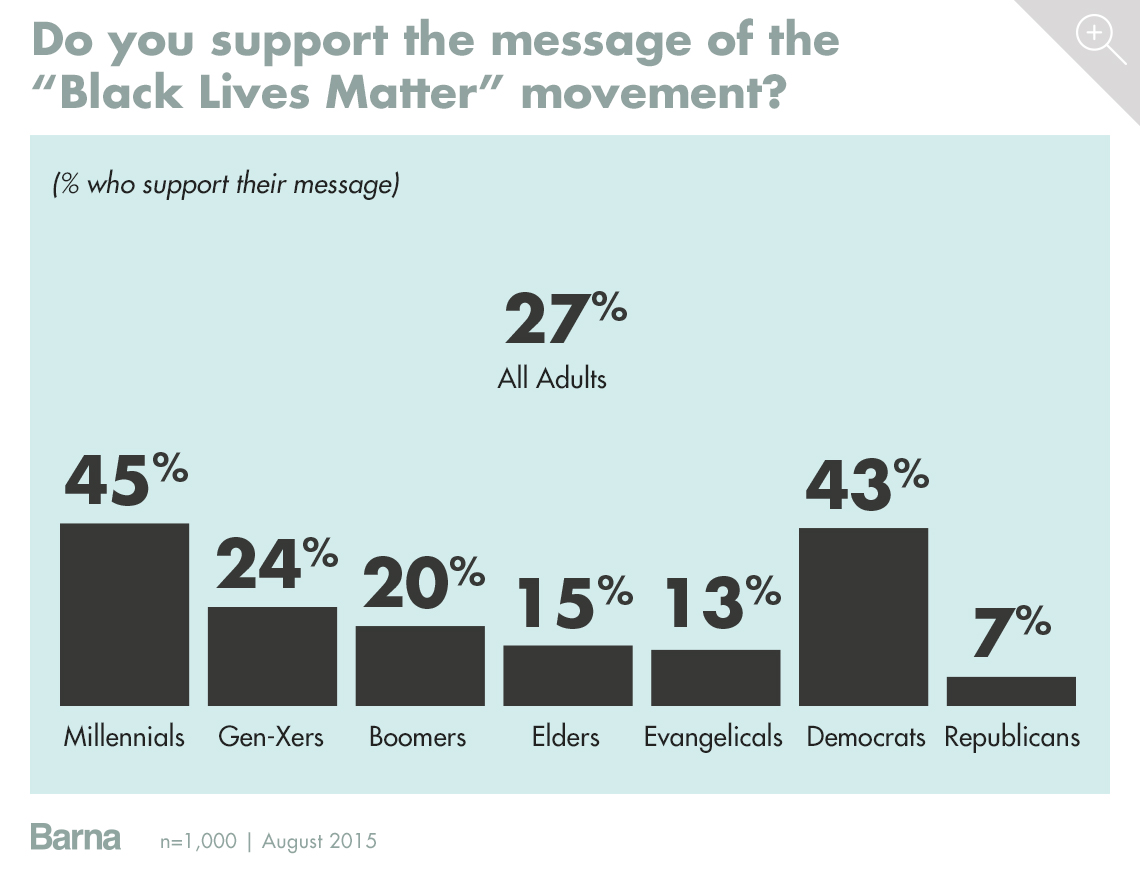
But the answer that consistently receives the largest response among all groups when asked how they feel about the “Black Lives Matter” movement is “I believe all lives matter.” This is the response of about half the general population (52%), and the most common response across the board. This reflects a deeper disconnect between the movement’s broader goals and the message being interpreted by the general population.
The phrase emerged in direct response to the Black Lives Matter movement, but as Obama himself argued in a press conference last year, “saying ‘black lives matter’ is not about reducing the importance of other groups, or suggesting nobody else’s lives matter, but that there is a specific problem happening in the African-American community that’s not happening in other communities. And that is a legitimate issue that we’ve got to address.”
Despite this, the majority of American adults respond using the reactive phrase: “all lives matter.” Yet again, the outliers here are evangelicals, Republicans and this time, born again Christians. Evangelicals were by far the group most likely to say “I believe all lives matter” (76%), followed by Republicans (66%), and those who say they are born again (61%). As in previous responses, there are stark differences between Republicans (who were among the highest at 66%), and Democrats (who were among the lowest at 41%).
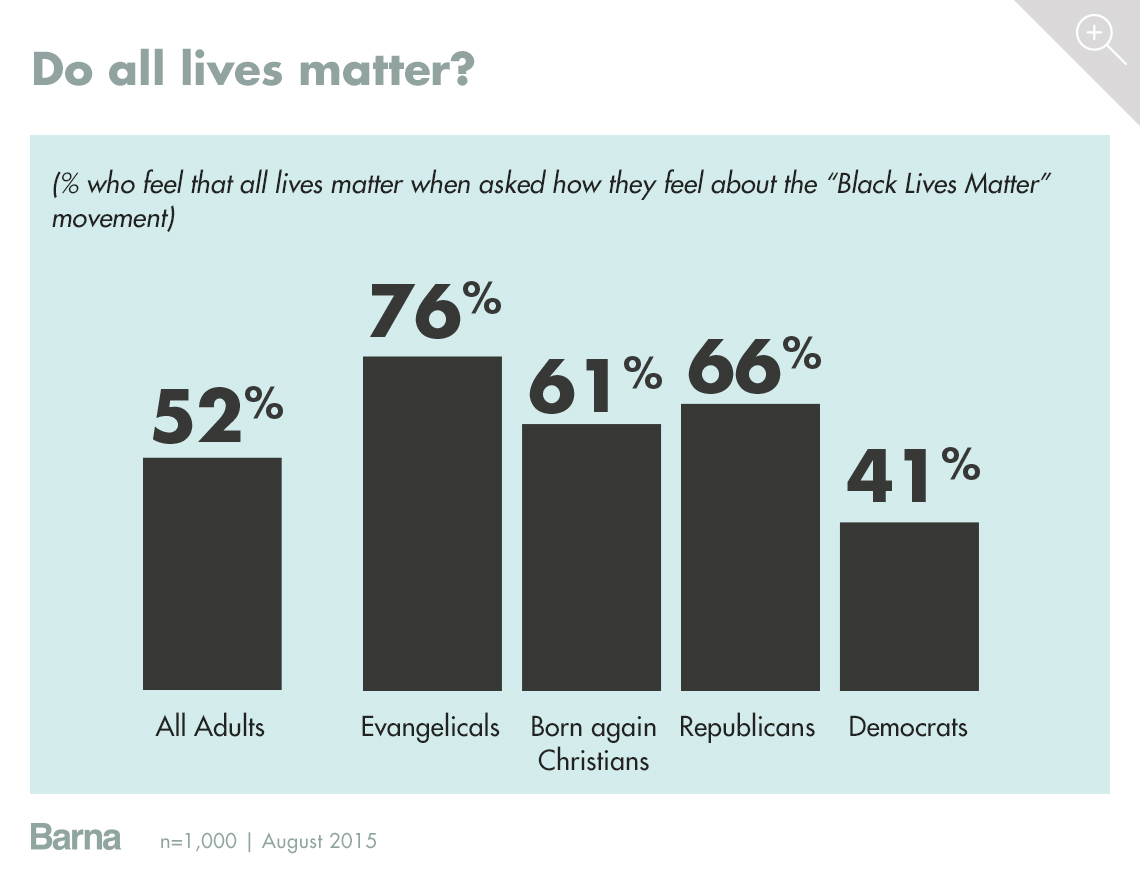
Race & the Church
Martin Luther King, Jr. once said, “It is appalling that the most segregated hour of Christian America is eleven o’clock on Sunday morning.” He, like many others, believed the Christian church could lead the charge when it came to racial reconciliation, but that it still had a long way to go. When asked whether Christian churches are part of the problem when it comes to racism, over six in 10 adults somewhat or strongly disagreed (62%). This is good news, although from a different angle, among those who strongly agreed it was a problem, there were double the amount of black people than white people (9% white compared to 17% black).
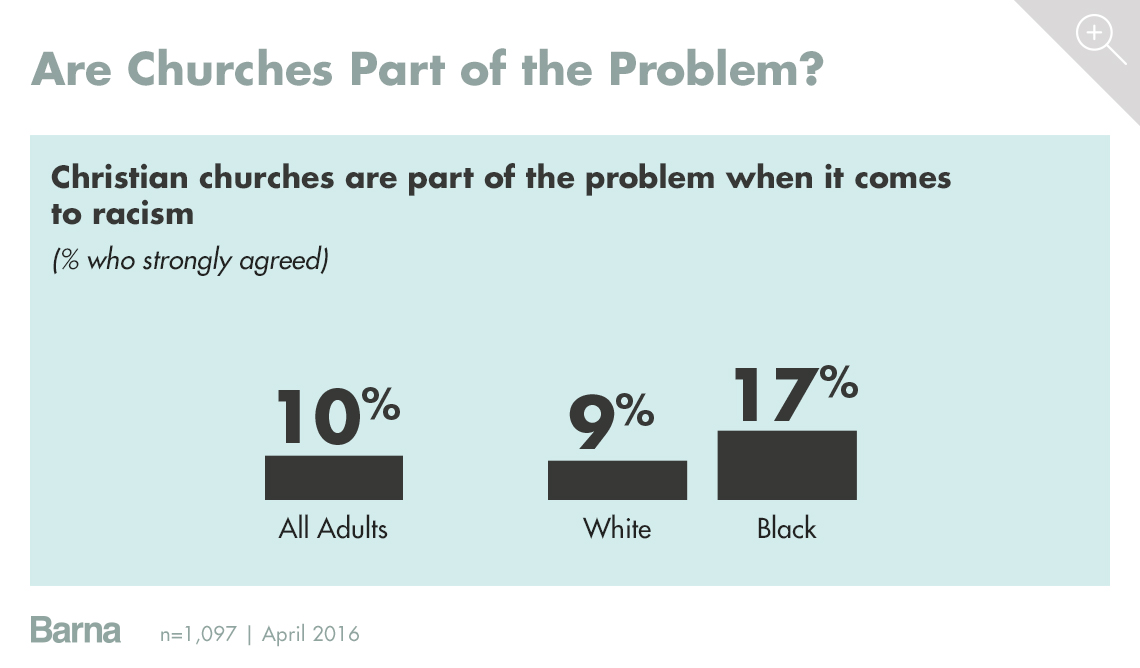
Despite these divides, three-quarters of Americans agree “Christian churches play an important role in racial reconciliation” (73%). This is extraordinarily hopeful news for the Christian church at-large. When broken down by generation, the older you are, the more hopeful you are about the Christian church’s role in reconciliation. There is a gradual increase with age beginning with Millennials at 66 percent, Gen-Xers at 69 percent, Boomers at 79 percent, and Elders at 84 percent. Not surprisingly, evangelicals are the most hopeful with a staggering 94 percent who believe Christian churches play an important role in racial reconciliation. Equally as unsurprising, those who do not identify with any faith tradition (53%) are less likely to believe churches play any role in racial reconciliation, but with more than half of this group actually agreeing, there remains a significant amount of hope, even among those outside the church.
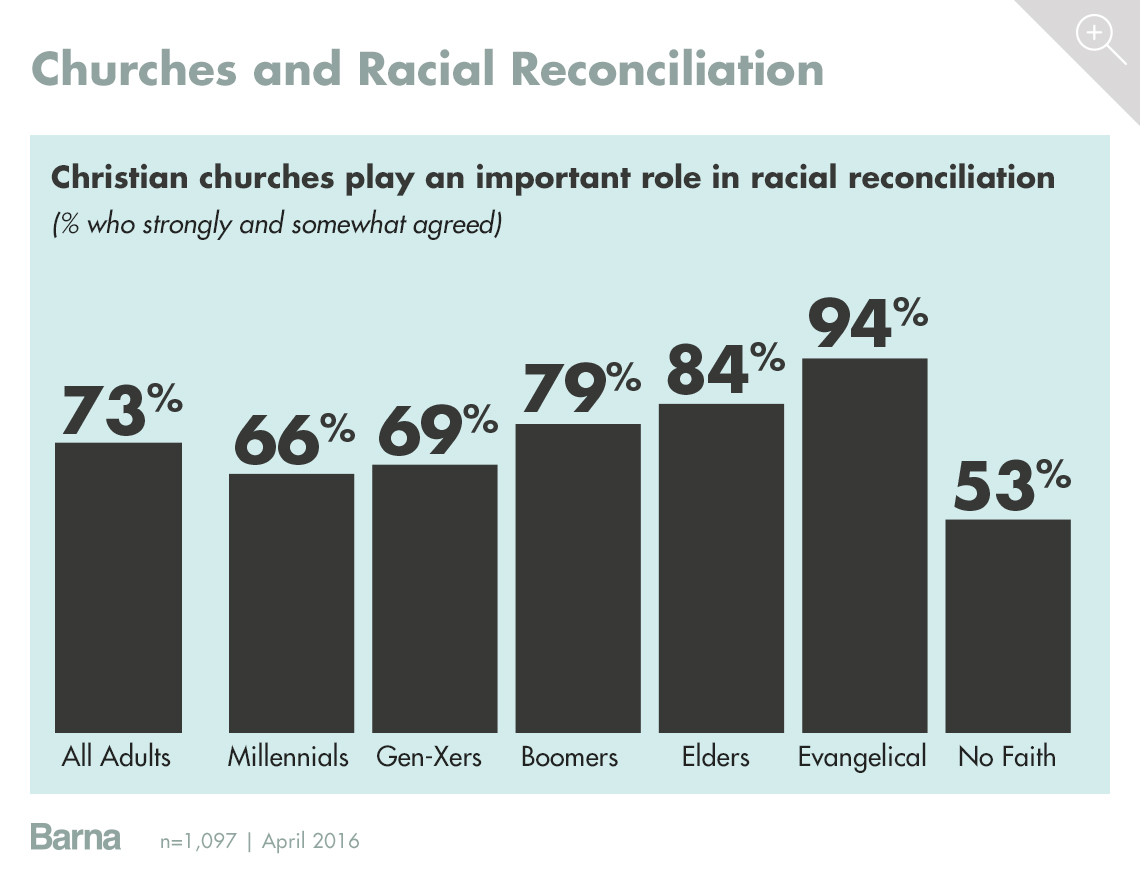
Where Do We Go From Here?
How U.S. Christians feel about racism - and what they believe it will take to move forward
What the Research Means
“Our research confirms the fear that the church (or the people in it) may be part of the problem in the hard work of racial reconciliation,” says Brooke Hempell, vice president of research at Barna Group. “If you’re a white, evangelical, Republican, you are less likely to think race is a problem, but more likely to think you are a victim of reverse racism. You are also less convinced that people of color are socially disadvantaged. Yet these same groups believe the church plays an important role in reconciliation. This dilemma demonstrates that those supposedly most equipped for reconciliation do not see the need for it.
“More than any other segment of the population, white evangelical Christians demonstrate a blindness to the struggle of their African American brothers and sisters,” Hempell continues. “This is a dangerous reality for the modern church. Jesus and his disciples actively sought to affirm and restore the marginalized and obliterate divisions between groups of people. Yet, our churches and ministries are still some of the most ethnically segregated institutions in the country.
“By failing to recognize the disadvantages that people of color face—and the inherent privileges that come from growing up in a ‘majority culture’—we perpetuate the racial divisions, inequalities and injustices that prevent African American communities from thriving,” Hempell says. “Research has shown that being cognizant of our biases leads to change in biased behavior. If white evangelical Christians genuinely care for the wellbeing of their African American brothers and sisters, the first step they must take is being honest about their own biases. History—and Jesus’ example—has shown that reconciliation comes from stepping out of our place of comfort and actively pursuing healing for those in need. We must do the same, if we really believe all lives matter.”
About the Research
2015 Study: The study on which these findings are based was conducted via online surveys from August 17 to August 21, 2015. A total of 1,000 interviews were conducted. The sample error is plus or minus 3.0 percentage points at the 95-percent confidence level. The completion rate was 66% percent.
2016 Study: The study on which these findings are based was conducted via online survey from April 7 to April 14, 2016. A total of 1,097 interviews were conducted. The sample error is plus or minus 2.8 percentage points at 95-percent confidence level. The completion rate was 85%.
Minimal statistical weighting was used to calibrate the sample to known population percentages in relation to demographic variables. The online study is derived from a probability panel, which means that respondents are recruited for inclusion in the research based on physical mailing addresses, not an opt-in online panel. Those randomly selected households without Internet access are provided an Internet-enabled device to complete surveys.
Evangelicals: those who meet nine sets of criteria, including having made a personal commitment to Jesus Christ that is still important in their life today and believing that, when they die, they will go to heaven because they have confessed their sins and accepted Jesus Christ as their savior. The seven other conditions for evangelicals include saying their faith is very important in their life today; believing they have a personal responsibility to share their religious beliefs about Christ with non-Christians; believing that Satan exists; believing that Jesus Christ lived a sinless life on earth; asserting that the Bible is accurate in all that it teaches; believing that eternal salvation is possible only through grace, not works; and describing God as the all-knowing, all-powerful, perfect deity who created the universe and still rules it today. Being classified as an evangelical is not dependent upon church attendance or the denominational affiliation of the church attended. Respondents were not asked to describe themselves as “evangelical.”
Born again: Have made a personal commitment to Jesus Christ that is still important in their life today and believe that, when they die, they will go to heaven because they have confessed their sins and accepted Jesus Christ as their savior.
Millennials: Born between 1984 and 2002
Busters/Gen-Xers: Born between 1965 and 1983
Boomers: Born between 1946 and 1964
Elders: Born between 1945 or earlier
No faith: identify as agnostic or atheist, or as having no faith
Republican: registered as a Republican at current address
Democrat: registered as a Democrat at current address
Liberal: identify as mostly liberal when it comes to political issues.
Conservative: identify as mostly conservative when it comes to political issues.
About Barna Group
Barna Group is a private, non-partisan, for-profit organization under the umbrella of the Issachar Companies. Located in Ventura, California, Barna Group has been conducting and analyzing primary research to understand cultural trends related to values, beliefs, attitudes and behaviors since 1984.
© 2016 by Barna Group.
About Barna
Since 1984, Barna Group has conducted more than two million interviews over the course of thousands of studies and has become a go-to source for insights about faith, culture, leadership, vocation and generations. Barna is a private, non-partisan, for-profit organization.
Related Posts

How the Church Can Fuel Black Gen Z’s Desire for Justice
- Faith
- Leadership
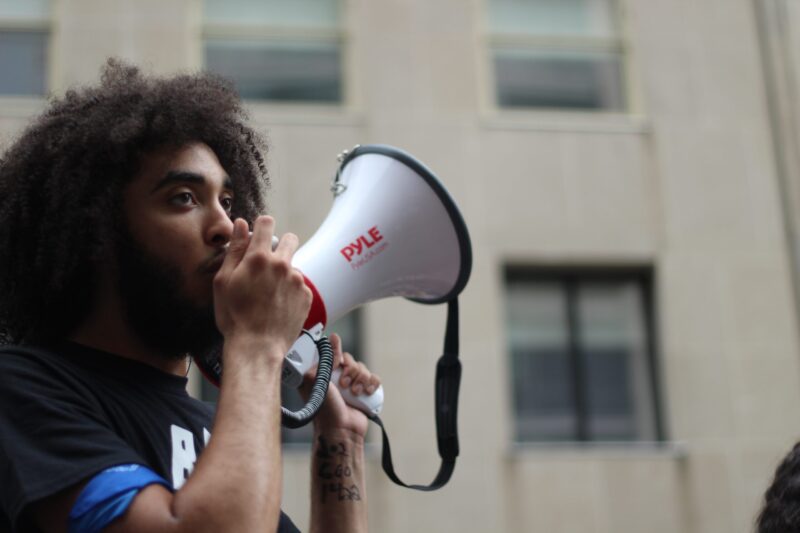
Black Practicing Christians Are Twice as Likely as Their White Peers to See a Race Problem
- Culture
- Faith
-
From the Archives

Racial Divides in Spiritual Practice
- Faith
-
From the Archives
Lead with Insight
Strengthen your message, train your team and grow your church with cultural insights and practical resources, all in one place.
Get Barna in Your Inbox
Subscribe to Barna’s free newsletters for the latest data and insights to navigate today’s most complex issues.
